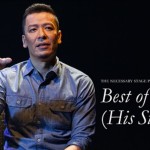“We Were So Hopeful Then”
Reviewer: Idelle Yee
Performance: 31 July 2019
Never has the title of a production been more appropriate. I began as an audience member of The Necessary Stage’s (TNS) We Were So Hopeful Then in an appropriate flurry of pre-show excitement and high hopes. Unfortunately, these hopes dwindled with the passing minutes. We exist in a world of wanton cruelties, but also of gentle mercies; the glimmer of redemptive energy in this instance is that the passing minutes in We Were So Hopeful Then are limited to 60.
Where did it all go wrong? The concept is certainly promising. Upon entering the black box, each audience member is handed a voting slip for the 2025 Singapore Theatre Icon Awards. There are four nominees to vote for. Everyone is a little confused, but somewhat intrigued to see how things play out. Interactive theatre is on-trend!
The play begins at the awards ceremony itself, with cleaner Akilan Deswari (Sindhura Kalidas) — a truly ambitious name meaning Supreme Goddess of the Universe — being presented to the audience as the Theatre Icon. The question that occurs to me is — wait, but what about that voting slip? Who are we voting for if the Icon has already been chosen? But this is the theatre, and all things are possible, so I shelve my misgivings.
(Spoiler: our votes, collected later, change nothing. Natch.)
From here on, everything becomes something of a temporal muddle. The production mainly consists of conversations that take place over five-year lapses (2015-2020-2025-2030) amongst four backstage staff — Akilan, female rigger Rose/Yanting, driver Uncle Bo, and scribe Lore Lam — in the theatre as a show is bumping in. Timeskips occur largely without warning. Everything is confusing.
Charting little changes in recapitulated conversations over long periods of time can indeed be a meaningful endeavour. Unfortunately, the temporal shifts in this production are so jarring and so obscurely indicated that I spend most of the production bemused — when are we now? The lack of temporal anchoring is also crippling to narrative tension. The processes through which characters arrive at their “present” struggle are far too exhausting to follow. How and when did this thing even happen? What is happening to the characters at this point in time? Why are they sad?
Characters also speak, entirely straight-faced, such disingenuous lines as: “It’s always easier to ask for forgiveness than to ask for permission”. Then there’s the strange ramble about how Rose is somehow a less feminine name than Yanting. This is supposed to be a naturalistic play, but who in real life speaks like this and gets taken seriously by their fellow human beings?
More tragically, this production’s own framing collapses on itself. It claims to expose the “invisibility in our working environment” and “question the rationale and implicit biases of public accolades”, but truthfully does neither. Its assemblage of backstage characters remain unseen, and worst of all, unheard. Not telling the stories of the little people is to be complicit in their invisibility; paying lip service to the importance of their narratives and employing hacky dialogue in the process is to cheapen the legitimacy and dignity of their voices.
These are harsh words. But it is often insufficient to have good intentions and high hopes in making theatre — little people’s stories matter, so let us tell them with the groundedness and sincerity they deserve.
Do you have an opinion or comment about this post? Email us at info@centre42.sg.
ABOUT THE PRODUCTION
WE WERE SO HOPEFUL THEN by The Necessary Stage
31 July – 4 August 2019
The Necessary Stage Black Box
ABOUT THE REVIEWER
Idelle is about to graduate from the National University of Singapore with a major in English Literature and a minor in Theatre Studies. She believes very much in the importance of reviewing as a tool for advocacy and education, to journey alongside local practitioners and audience members alike in forging a more thoughtful, sensitive arts community.





